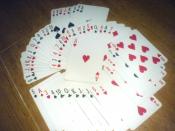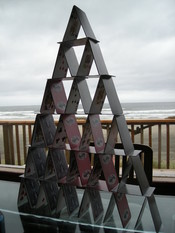Ah, "Good Country People." I remember the first time I read this story, being struck by the unequivocally appropriate character names. Unhappy "Joy" with her ugly temperament that prefers "Hulga," "Mrs. Hopewell" with "no bad qualities of her own" and a ridiculous sense of optimism, "Manly Pointer" (hah! still gets me every time) the bible salesman with hollowed out holy books full of liquor and dirty playing cards and condoms...
O'Connor introduces conflict into the story immediately with Mrs. Freeman's two faces (an apt, foreshadowy symbol for the other 'good country person' in this tale,) and keeps it up all the way to the end, with Joy-Hulga stuck in the barn loft and her idiotic mother none the wiser. Though most of the story follows Mrs. Hopewell and her thoughts, the viewpoint switch (still limited third but no longer following Mrs. H) near the end of the story makes it Joy-Hulga's.
She is the character who experiences the comeuppance, the realization of her own fault in being deceived by someone she thought grossly inferior. And O'Connor certainly dons the irony hat in an oh-so-appropriate way with the story's last sentence.
Joy-Hulga's characterization throughout the story, constantly pouty and stomping and implacable, makes her very childlike in spite of her education, and her naïvete intensifies it. Even her mother thinks of her grown-up daughter as a child. As much as this is a 'revelation' story, it is also a coming-of-age one. Joy-Hulga comes out of the story not only wiser in the ways of the world, but also, inferably, more mature as a result of her encounter with Manly Pointer (tee-hee.)


